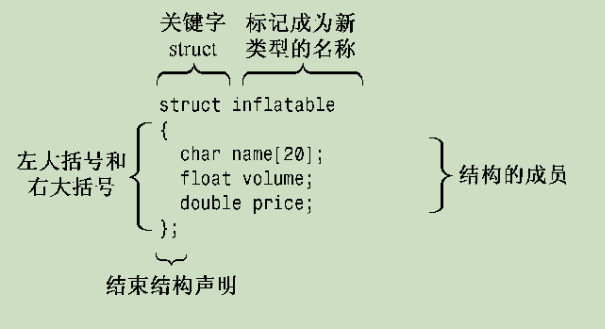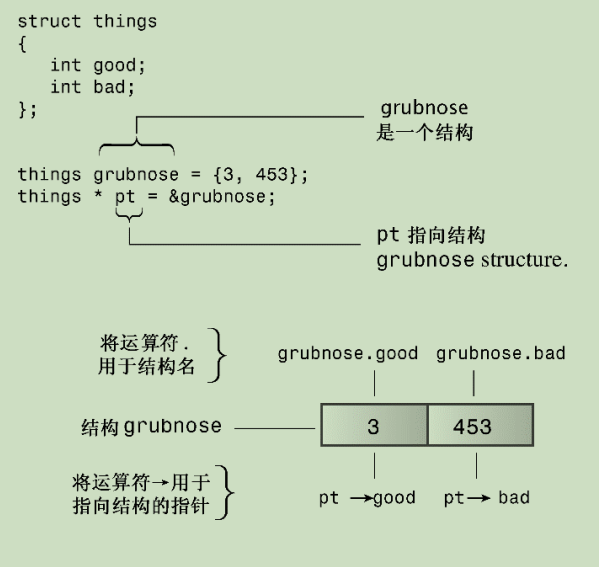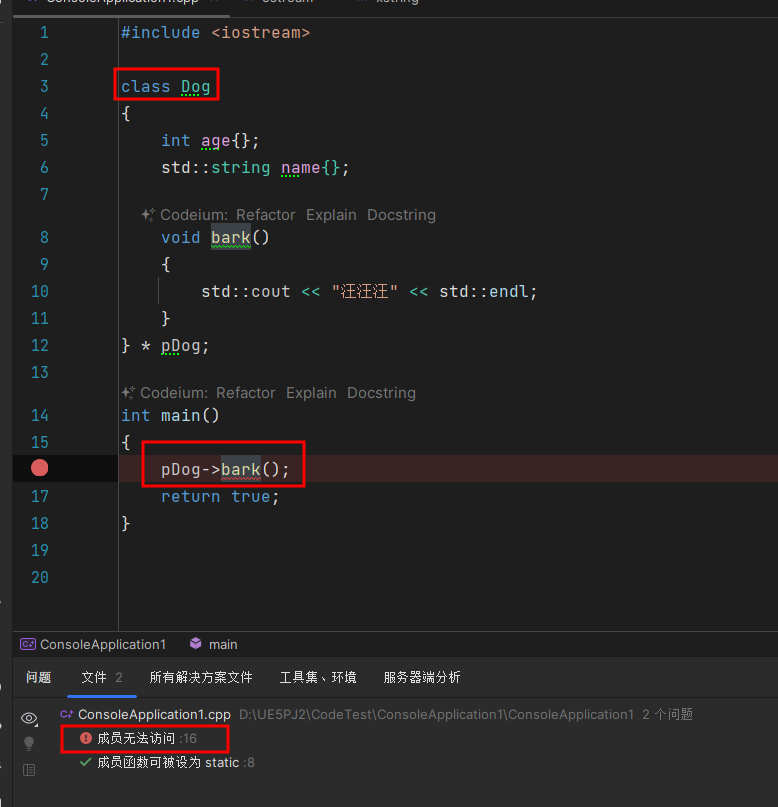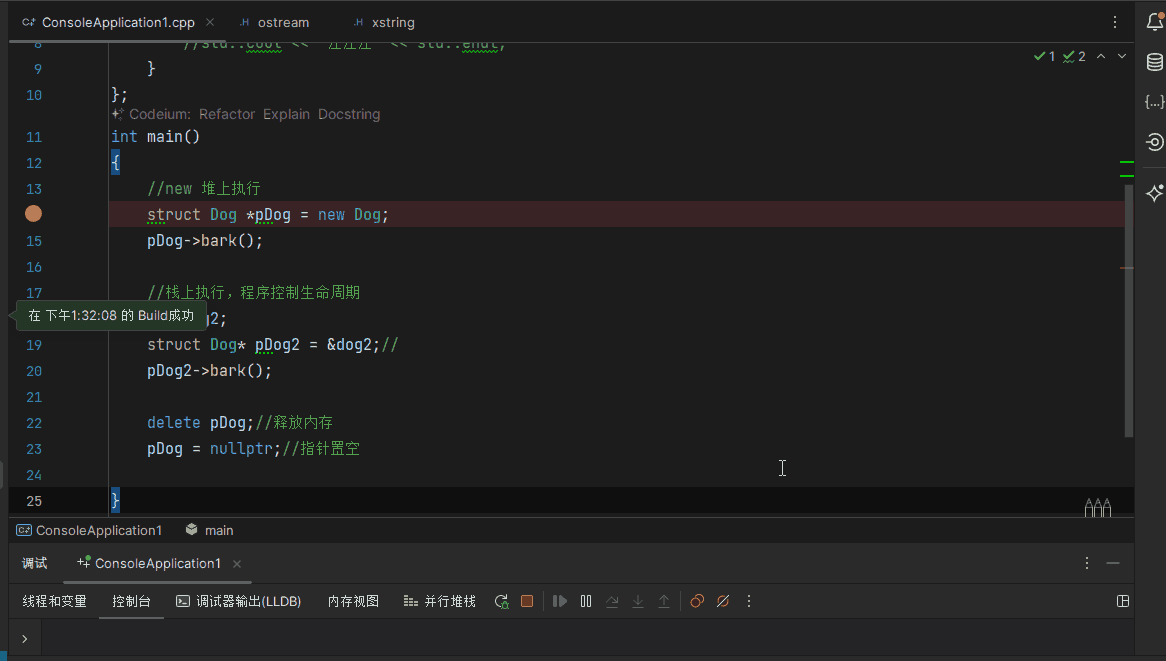c++结构体指针|类指针
大约 4 分钟
语法:struct 结构体名称 { 成员列表 };

结构体指针
语法: struct 结构体名称 * 指针变量名 = & 结构体对象;

结构体指针定义方法
1. struct 结构体名称 * 指针变量名 = & 结构体对象;
#include <iostream>
struct Dog {
int age{};
std::string name{};
void bark() {
std::cout << "汪汪汪" << std::endl;
}
};
int main()
{
//new 堆上执行
struct Dog *pDog = new Dog;
pDog->bark();
//栈上执行,程序控制生命周期
Dog dog2;
struct Dog* pDog2 = &dog2;//
pDog2->bark();
delete pDog;//释放内存
pDog = nullptr;//指针置空
}
堆上分配内存:
struct Dog *pDog = new Dog;这行代码在堆上动态分配了一个
Dog对象,并将其地址赋给了pDog指针。在这种情况下,需要记得使用delete来释放这块内存。栈上分配内存:
Dog dog2; struct Dog* pDog2 = &dog2;创建了一个
Dog对象dog2,并用&dog2将其地址赋给了pDog2指针。在这种情况下,对象的生命周期受限于其所在的作用域,不需要手动释放内存。释放内存:
delete pDog;
2. 在定义结构体时直接定义成指针
#include <iostream>
struct Dog
{
int age{};
std::string name{};
void bark()
{
std::cout << "汪汪汪" << std::endl;
}
} * pDog;
int main()
{
pDog->bark();
return 0;
}
结构体数组
#include <iostream>
#include <vector> // 使用 std::vector 代替数组
struct Dog {
int age{};
std::string name{};
void bark() {
std::cout << "汪汪汪" << std::endl;
}
};
int main() {
// 使用 std::vector 代替数组
std::vector<Dog> dogs = {
{3, "大黄"},
{2, "大白"}
};
// 修改第二只狗的年龄
dogs[1].age = 4;
// 使用 new 创建堆上的对象,而不是栈上的数组
Dog* pDog = new Dog;
pDog->age = 3;
pDog->name = "大黄";
pDog->bark();
// 使用 std::vector 管理动态分配的对象
std::vector<Dog*> dogPointers;
dogPointers.push_back(new Dog{5, "小黑"});
dogPointers.push_back(new Dog{2, "小白"});
// 遍历 vector,并释放动态分配的对象
for (Dog* p : dogPointers) {
p->bark();
delete p;
}
dogPointers.clear();
return 0;
}
结构体嵌套
#include <iostream>
struct Cat
{
std::string name{};
int age{};
void catbark() const
{
std::cout << "m~m~m" << std::endl;
}
};
struct Dog
{
std::string name{};
int age{};
void dogbark() const
{
std::cout << "w~w~w" << std::endl;
}
struct Cat myCat;
};
void printstruct(const Dog* d, const Cat* c)
{
std::cout << "我的小狗名叫:" << d->name <<"今年"<<d->age<<"岁,快跟大家打招呼!"<<std::endl;
std::cout << d->name <<":";
d->dogbark();
std::cout << "小狗" << d->name << "的朋友叫:" << c->name <<"今年"<<c->age<<"岁,快跟大家打招呼!"<<std::endl;
std::cout << c->name <<":";
c->catbark();
}
int main()
{
Dog myDog;
struct Dog* PDog = &myDog;
struct Cat* PCat = &PDog->myCat;
PDog->name = "小白";
PDog->age = 3;
PCat->name = "小咪";
PCat->age = 2;
printstruct(PDog, PCat);
}
类指针

语法 :class 类名称 * 指针变量名 = new 类对象;
#include <iostream>
// 类定义
class MyClass {
public:
int x;
MyClass(int val) : x(val) {}
void display() { std::cout << "Value: " << x << std::endl; }
};
// 结构体定义
struct MyStruct {
int y;
MyStruct(int val) : y(val) {}
void display() { std::cout << "Value: " << y << std::endl; }
};
int main() {
// 类指针
MyClass* ptrClass = new MyClass(10);
ptrClass->display();
delete ptrClass;
// 结构体指针
MyStruct* ptrStruct = new MyStruct(20);
ptrStruct->display();
delete ptrStruct;
return 0;
}
声明前置
#include <iostream>
class Dog*Pdog;//声明前置
class Dog
{
public:
int age{};
std::string name{};
void bark()
{
std::cout << "汪汪汪" << std::endl;
}
};
int main()
{
Pdog->bark();
return true;
}



